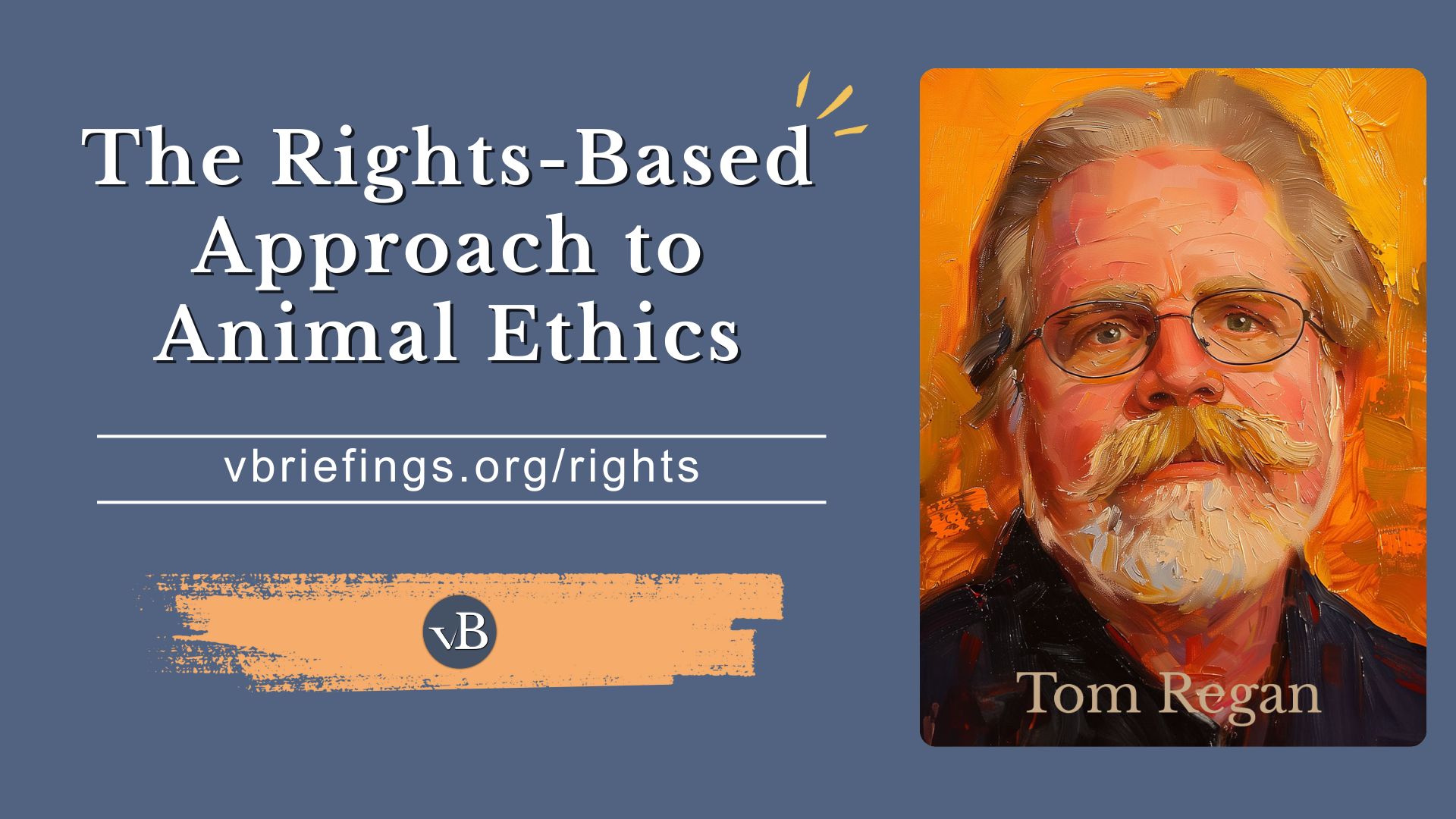Preface
Briefing description and more.
This briefing summarizes the key concepts of animal rights philosophy as espoused by philosopher Tom Regan.
Companion Videos
How to use companion videos
Videos may be posted on multiple social media platforms, and you can share them on each platform according each platform’s conventions.
Share this Briefing
Social Media Sharing Image
This image will be used when sharing the briefing on a social media platform. You can see all social sharing images in the grid view.

How to share this briefing
Click on the icon for the platform on which you wish to share. What happens next depends on the platform, but generally a popup will appear, letting you add your own text as you share.
Briefing Meta
Metrics
Note: we will publish additional briefings after completing flashcards and presentation slides for selected briefings.
Counts:
| Main Text | |
| Key Concepts | 5 |
| Counterclaims | 1 |
| Supplementary | 2 |
| Further Study | 5 |
| Footnotes | 16 |
| Media & Advocacy | |
| Advocacy Notes | 10 |
| —Socratic Questions | 14 |
| Flashcards | 22 |
| Presentation Slides | 0 |
| Memes & Infographics | 0 |
| Companion Videos | 0 |
Other Meta:
Date Posted:
Last Edited:
Edit Log:
Key Points Links
Loading…
Help Us Improve
Please send your suggestions for improvements, or report any issues with this briefing to team@vbriefings.org
We appreciate that you are taking the time to help up improve. All suggestions and reports will be carefully considered.
Summary
A concise summary of the briefing (see below for citations).
Animal rights philosophy, shaped significantly by Tom Regan, emphasizes animals’ inherent value and moral status, independent of their utility to humans. This perspective prioritizes the inviolable rights of individual animals as a matter of justice. The perceived lack of moral agency in nonhuman animals does not diminish their rights, just as the rights of individuals with intellectual disabilities are recognized and upheld despite similar limitations.
Context
Places this topic in its larger context.
Animal rights is only one of several philosophical approaches to animal ethics. Some of the others are utilitarianism, virtue ethics, and ethics of care. We will summarize these other approaches in other briefings.
The term animal rights is often used to describe a general concern for animals, rather than the rights-based philosophy that rejects all forms of exploitation.
Animal rights philosophy challenges traditional ethical frameworks and expands the sphere of moral consideration.
By arguing for the inclusion of animals in our moral circle, animal rights philosophy prompts a reevaluation of long-held ethical principles and practices. This expansion of moral consideration has implications not just for our treatment of animals, but for our understanding of ethics as a whole.
Key Points
This section provides talking points.
Animals have inherent value and moral status independent of their utility to humans.
Animal rights philosophy emphasizes respect for individual animals rather than aggregate welfare.
This approach, exemplified by Regan’s work, contrasts with utilitarian perspectives by focusing on the inviolable rights of individual animals rather than on maximizing overall welfare or happiness.1 It argues that the rights of individuals should not be sacrificed for the greater good.
The concept of “subjects-of-a-life” provides a basis for ascribing rights to other animals.
Regan argues that beings who are “subjects-of-a-life”—those with beliefs, desires, perception, memory, a sense of the future, an emotional life, preferences, welfare interests, and psychophysical identity over time—have inherent value and, consequently, rights.2
The right to be treated respectfully is a matter of justice.
Regan argued that animals have inherent value and moral rights, including the right to be treated with respect and to live without human oppression.
Regan believed it is not a question of kindness or compassion to treat animals respectfully; it is an act of justice.3
Animals’ inability to be moral agents doesn’t diminish their rights.
Tom Regan distinguishes between moral agents, who can make moral decisions, and moral patients, who cannot but still deserve moral consideration.4
While humans are moral agents, animals are moral patients since they can be harmed by others’ actions but may lack the ability to make moral judgments.5
Regan argues that animals’ inability to be moral agents doesn’t diminish their inherent value or rights. Like humans, their capacity to experience life and suffering qualifies them for moral protection. Some individuals with intellectual disabilities may not be moral agents, yet their rights are still recognized and protected.6
Counterclaims
Responses to some yes but retorts.
Claim: Cognitive differences between humans and most animals are morally relevant and justify different treatment.
Regan (and others) have not argued that humans and other animals be treated exactly the same or have exactly the same rights.
Regan points out that some humans (e.g., infants, severely cognitively impaired individuals) have lower cognitive capacities than some animals, yet we still grant them full moral status. Therefore, cognitive capacity alone cannot be the basis for moral consideration.7
Supplementary Info
Additional information that may prove useful.
Tom’s Regan’s definition of a right.
- For Tom Regan, a “right” is a moral protection of an individual’s inherent interests, such as the interest in avoiding harm or exploitation. It is based on the idea that beings with inherent value—whether human or nonhuman—are entitled to have their fundamental interests respected and safeguarded, regardless of others’ desires or needs.8
Tom Regan’s Speech.
- This is a transcript of Tom Regan’s 1989 speech at the Royal Institute of Great Britain. A video of the speech is available on YouTube.9
Full Transcript:
“The other animals humans eat, use in science, hunt, trap and exploit in a variety of other ways have a life of their own that is of importance to them, apart from their utility to us. They are not only in the world, they are aware of it and also of what happens to them, and what happens to them matters to them.
“Each has a life that fares experientially better or worse for the one whose life it is. Like us they bring a unified, psychological presence to the world. Like us they are somebodies, not somethings. In these fundamental ways the nonhuman animals in labs or on farms, for example, are the same as human beings. And so it is that the ethics of our dealings with them and with one another must rest on some of the same fundamental moral principles.
“At its deepest level, an enlightened human ethics is based on the independent value of the individual. To treat human beings in ways that do not honor their independent worth—to reduce them to the status of tools, or models or commodities, for example—is to violate that most basxic of human rights, the right to be treated with respect.
“The philosophy of animal rights demands only that the logic be respected. For any argument that plausibly explains the independent value of human beings implies that other animals have the same value and have it equally. And any argument that plausibly explains the rights of humans to be treated with respect also implies that these other animals have the same rights and have it equally also.
“As a result of selected media coverage in the past—which this evening’s debate is a notable and praiseworthy exception—the general public has tended to view advocates of animal rights in exclusively negative terms. We are anti-intellectual, anti-science, anti-rational, anti-human. We stand against justice and for violence. The truth, as it happens, is quite the reverse. The philosophy of animal rights is on the side of reason, for it is not rational to discriminate arbitrarily, and discrimination against nonhuman animals is demonstrably arbitrary. It is wrong to treat weaker human beings, especially those who are lacking a normal human intelligence, as tools or models, for example.
“It cannot be rational, therefore, to treat other animals as if they were tools, models and the like if their psychology is as rich as, or richer than, these human beings.
“The philosophy of animal rights is pro, not anti-science. This philosophy is respectful of our best science in general and of evolutionary biology in particular. The latter teaches us that, in Darwin’s words, humans differ from many other animals in degree and not in kind. Questions about line-drawing to aside, it is obvious that the animals used in laboratories, raised for food, and hunted for pleasure, or trapped for profit, for example, are our psychological kin. This is not fantasy. This is fact, supported by our best science.
“The philosophy of animal rights stands for, not against justice. We are not to violate the rights of the few so that the many might benefit. Slavery allows this. Child labor allows this, all unjust social institutions allow this. But not the philosophy of animal rights, whose highest principle is that of justice.
“The philosophy of animal rights stands for peace, and against violence. The fundamental demand of this philosophy is to treat humans and other nonhuman animals with respect. This philosophy, therefore, is a philosophy of peace. But it is a philosophy that extends the demand for peace beyond the boundaries of our species, for there is an undeclared war being waged everyday against countless millions of nonhuman animals.
“To stand truly for peace is to stand firmly against their ruthless exploitation.
“And what, aside from the common menu of media distortions, will be said by the opponents of animal rights? Will the objections be that we are equating animals and humans in every respect when, in fact, humans and animals differ greatly? But clearly, we are not saying that humans and other animals are the same in every way; that dogs and cats can do calculus, or that pigs and cows enjoy poetry. What we are saying is that, like humans, many other animals have an experiential welfare of their own. In this sense, we and they are the same. In this sense, therefore, despite our many differences, we and they are equal.
“Will the objection be that we are saying that every human and every animal has the same rights, that chickens should have the right to vote, and pigs the right to ballet lessons? But, of course, we are not saying this. All we are saying is that these animals and humans share one basic moral right: the right to be treated with respect.
“Will the objection be that because animals do not respect our rights, we therefore have no obligation to respect their rights either? But there are many human beings who have rights and are unable to respect the rights of others—young children, and the mentally enfeebled and deranged of all ages. In their case, we do not say that it is perfectly all right to treat them as tools, models or commodities, because they do not honor our rights. On the contrary, we recognize that we have a duty to treat them with respect.
“What is true of cases involving these human beings is no less true of cases involving other animals.
“Will the objection be that, even if other animals do have moral rights, there are other more important things that need our attention—world hunger, and child abuse, for example? Apartheid, drugs, violence to women, the plight of the homeless? After we take care of these problems, then we can worry about animal rights?
“This objection misses the mark for the rank and file of the animal rights movement is composed of people whose first line of service is human service: doctors, nurses and other health care professionals; people involved in a broad range of social services from rape counseling to aiding victims of child abuse, or famine, or discrimination; teachers of every level of education; ministers, priests, rabbis.
“The lives of these people demonstrate that the choice that people face is not between either helping humans or helping other animals. One can do both. We should do both.
“Is it rational? Impartial? Scientifically informed? Does it stand for peace and against injustice? To all these questions, the answer is an unqualified yes. And as for the objections that are raised against this philosophy–are those who accept it able to offer rational, informed answers? Again, the answer is yes.
“In the battle of ideas, the philosophy of animal rights wins. Its critics lose. It remains to be seen which side emerges as the victor in the ongoing political battle between what is just and what is not.”
Further Study
Sources providing a deeper understanding of the topic or related topics.
Other Resources
Tom Regan’s 1986 paper “The Case for Animal Rights“10 presents his case for animal rights and is available for online reading.
Tom Regan’s Book, The Case for Animal Rights (1983)11 is considered a seminal work in animal rights philosophy. For an easier to read, less rigorous treatment of his philosophy, see his Defending Animal Rights (2000)12 or Animal Rights Human Wrongs (2003)13.
This academic article examines Tom Regan’s Philosophy of Animal Rights “in the context of discussions of intrinsic and inherent worth.” It discusses their relevance and applicability in modern ethical and legal debates.14
The Stanford Encyclopedia of Philosophy provides a comprehensive overview of the philosophical arguments for a moral status for animals, including rights-based approaches.15
The Internet Encyclopedia of Philosophy section on animals and ethics provides an academic overview of animal rights philosophy, including rights-based approaches.16
Advocacy Resources
Information to help with outreach and advocacy.
Note: we will publish additional briefings after completing flashcards and presentation slides for selected briefings.
Share This Briefing
Cloned from the Preface Section on page load.
Companion Videos
Cloned from the Preface Section on page load.
Memes and Infographics
No images found.
How to use Memes and Infographics
To sequence through all memes and infographics on this page, click on any image than use the arrow keys or the arrow buttons to show next and previous images.
To share a meme or infographic, right click on the image and choose download or save as. Then upload the image to the platform of choice.
Presentation Slides
Slides not available.
How to Use the Presentation Slides
You can view the slideshow full screen by clicking on the first link above.
To use Canva presenter mode, view the speaker notes, or download the slides as PowerPoint, login to Canva (the free account works) and follow the Full Canva Link provided above.
To copy this presentation to your own Canva project, use the Full Canva Link provided above, then select File->Make a Copy from the upper left. You can build your own unique presentation from multiple briefings by copying the presentation from each briefing and then building another presentation from the copied presentations.
Flash Cards
We partner with Brainscape because of their excellent features for learning. You will need to create a free Brainscape account to study the cards.
Go to Flash Cards: This will take you to a list of decks.
About Flash Cards and Brainscape
Flash cards are here to help you commit important facts and concepts in this briefing to memory.
In Brainscape, there is one deck for each briefing. You can study more than one deck at a time. Brainscape uses spaced repetition to promote memory retention. It is “the secret to learning more while studying less.”
You can study using your browser, but Brainscape also has a free mobile app that makes learning anywhere easy.
Socratic Questions
Socratic-style questions are embedded in the Advocacy Notes below, and shown in italics.
These are open-ended, thought-provoking questions designed to encourage critical thinking, self-reflection, and deeper understanding. They are inspired by the Socratic method, a teaching technique attributed to the ancient Greek philosopher Socrates, who would ask his students probing questions rather than directly providing answers.
The goal is to help people examine their beliefs, clarify their thoughts, uncover assumptions, and explore the evidence and reasoning behind their ideas.
Advocacy Notes
Tips for Advocacy and Outreach
General Tips
Animal rights philosophy strengthens the case for veganism, and is helpful in discussions with any audience that values the exploration of ideas.
Gauge your audience. It may be best to not delve too deeply into the topic unless your audience is well-versed in philosophy or interested in exploring it further. This is because you might come across as overly academic or as if you think you’re intellectually superior.
That said, the author’s experience is that discussing this topic in depth on college campuses is very effective.
Many assume that rights are exclusive to humans or that animals lack the qualities necessary for moral consideration. Your goal is to challenge these assumptions using a rights-based framework and show that justice demands recognizing animals as individuals with moral rights.
Challenge the Idea That Rights Depend on Usefulness to Humans
Some people believe that animals only matter if they serve human interests. The rights-based approach rejects this completely, asserting that animals have inherent moral worth.
- “Animal rights aren’t about what animals can do for us. Do you recognize that other animals have value simply because they are sentient beings, just like us?”
- “If a being’s worth depended on how useful they were to others, wouldn’t that justify mistreating humans who can’t work or contribute to society?”
Why? This exposes the flaw in the idea that value depends on usefulness rather than intrinsic worth.
Explain That Rights Are About Justice, Not Kindness
People often think of being kind to animals as an act of generosity, rather than a moral duty. A rights-based approach makes it clear that it’s not about kindness—it’s about justice.
- “We don’t consider not harming humans an ‘act of kindness’—it’s simply what justice demands. Why should it be different for animals?”
- “Tom Regan argued that respecting animals isn’t about being nice—it’s about recognizing that they have the right to live free from exploitation. If it’s unjust to oppress a human, why isn’t it unjust to oppress an animal?”
Why? This shifts the focus from charity to obligation, making it harder to dismiss.
Counter the “Animals Aren’t Moral Agents” Argument
People sometimes argue that because animals don’t follow moral codes or respect rights themselves, they shouldn’t have rights. But rights are not based on moral agency—they are based on being capable of suffering and experiencing life.
- “Newborn babies and people with intellectual disabilities aren’t moral agents, but we still recognize their rights. If moral agency were required for rights, would we deny rights to them?”
- “Animals, like humans, can suffer and have an interest in avoiding harm. Why should their lack of moral reasoning make their suffering less important?”
Why? This forces them to apply their reasoning consistently, exposing a contradiction.
Use the “Subjects-of-a-Life” Standard
Tom Regan’s “subjects-of-a-life” concept argues that animals have rights because they have their own experiences, desires, and sense of self.
- “Animals aren’t just objects—they have beliefs, desires, emotions, and a sense of the future. So why wouldn’t they deserve moral rights, just like humans?”
- “If an animal can feel fear, make choices, and remember past experiences, does that sound like a being whose life doesn’t matter?”
Why? This moves beyond intelligence-based arguments and makes it about the experience of life itself.
Address the “Animals and Humans Have Different Rights” Argument
Some people assume that giving animals rights means treating them exactly like humans, which can lead to absurd objections like “Should animals have the right to vote?”
- “No one is saying animals should have to right to vote. But shouldn’t they have the right to live free from human harm, just like children or people with disabilities who also don’t have all the same rights as adults?”
- “Shouldn’t rights be based on what’s relevant to a being’s nature? A dog doesn’t need the right to vote, but they do need the right not to be tortured or killed for human convenience.”
Why? This shows that rights are about fairness, not sameness.
Counter the “Moral Consideration Is Based on Intelligence” Argument
Some claim that humans have rights because of their intelligence or advanced reasoning, and since animals have less cognitive ability, they don’t deserve moral consideration.
- “If intelligence determined moral worth, would that mean people with lower IQs have fewer rights?”
- “An octopus might be more intelligent than a newborn baby, but we don’t say babies have fewer rights. If intelligence isn’t the measure for human rights, why should it be for animals?”
Why? This exposes the inconsistency in intelligence-based arguments.
Footnotes
Our sources, with links back to where they are used.
- Regan, Tom. The Case for Animal Rights. University of California Press, 1983, 280. ↩︎
- Regan, Tom. The Case for Animal Rights. University of California Press, 1983, 245. ↩︎
- Regan, Tom. The Case for Animal Rights. University of California Press, 1983, 280. ↩︎
- Regan, Tom. The Case for Animal Rights. University of California Press, 1983, 233. ↩︎
- Regan, Tom. The Case for Animal Rights. University of California Press, 1983, 349. ↩︎
- Regan, Tom. The Case for Animal Rights. University of California Press, 1983, 193. ↩︎
- Regan, Tom. The Case for Animal Rights. University of California Press, 1983, 19. ↩︎
- Regan, Tom. The Case for Animal Rights. University of California Press, 1983, 359-360. ↩︎
- easyaspeace. Tom Regan, 1989 Speech at the Royal Institute of Great Britain, YouTube ↩︎
- Regan, T. (1986). A case for animal rights. In M.W. Fox & L.D. Mickley (Eds.), Advances in animal welfare science 1986/87 (pp. 179-189). Washington, DC: The Humane Society of the United States. ↩︎
- Regan, Tom. The Case for Animal Rights. University of California Press, 1983, ↩︎
- Regan, Tom. Defending Animal Rights. University Of Illinois Press. November 30, 2000. ↩︎
- Regan, Tom. Animal Rights, Human Wrongs. Rowman & Littlefield Publishers, November 19, 2003. ↩︎
- Lengauer, Erwin. “Tom Regan’s Philosophy of Animal Rights: Subjects-of-a-Life in the Context of Discussions of Intrinsic and Inherent Worth.” Problemos, vol. 97, 2020, pp. 87–98. Accessed July 2, 2024. ↩︎
- Gruen, Lori. “The Moral Status of Animals.” Stanford Encyclopedia of Philosophy. October 1, 2017. plato.stanford.edu/entries/moral-animal/. Accessed July 2, 2024. ↩︎
- Fieser, James. “Ethics: Animals.” Internet Encyclopedia of Philosophy. Accessed July 2, 2024. ↩︎




